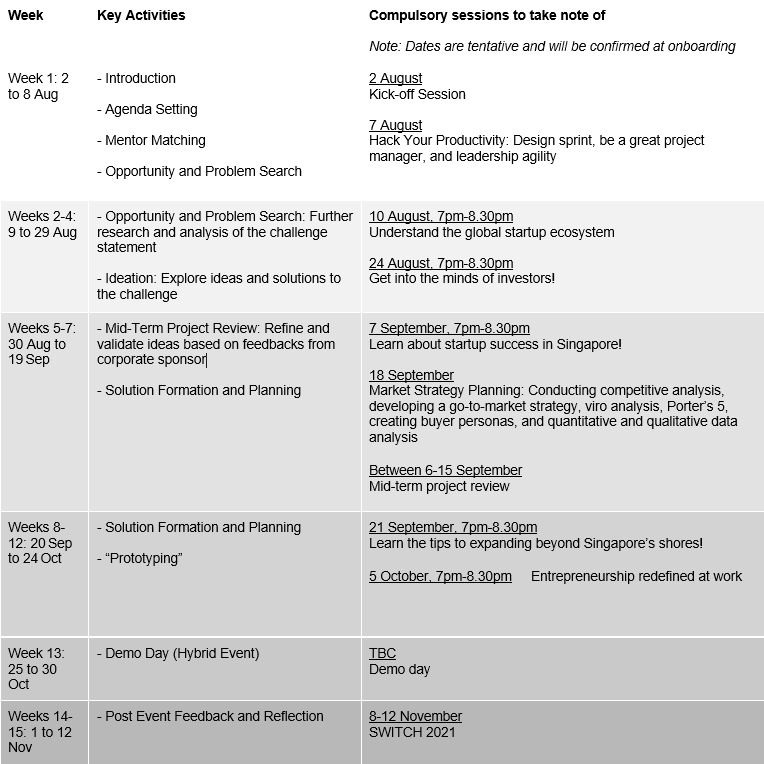Youth Challenge
Are you a youth with a passion for sustainability and an interest to turn your ideas into actionable solutions?
The Talent @ SWITCH Youth Challenge is a 3-month programme taking place from August to October, as part of the Talent @ SWITCH Entrepreneurship Exposure Series (EES) and in partnership with the ASEAN Business Youth Association. Centred around the theme of ‘Sustainability’, this immersive, project-based experience aims to provide you with an opportunity to tackle real-world challenges issued by organisations and related to one of the following topics: (i) Food Security and Resilience; (ii) Liveable Cities; or (iii) Impact Investing.
You will work in small project teams with like-minded peers and be guided by an industry mentor. The journey will culminate in a demo day, where teams will pitch their ideas to organisations that are keen on supporting youth-led solutions.
Apart from working on the challenge project, you will also undergo the 5-session webinars under the Entrepreneurship Exposure Series and 2 additional skills-based workshops.
This is the perfect chance to sharpen your technical and soft skills, while putting your newly acquired knowledge on innovation and entrepreneurship to the test.
Registrations for the Talent @ SWITCH Youth Challenge has closed. However, you can get your 1-For-1 SWITCH Pass by 30 September to access the Talent @ SWITCH Entrepreneurship Exposure Series (EES) and all of SWITCH’s year-long webinars through 2022!
Read on for more details on the theme, programme schedule and commitment required.
Why sustainability?
Sustainability is a growing focus across Southeast Asia, as witnessed by the recent shifts in attitudes among the region’s governments, corporates, investors and citizens. The region has enjoyed tremendous economic growth in the past two decades, reducing poverty rates, growing its middle class, and attracting huge foreign investments. Unfortunately, development was accompanied by environmental degradation such as air and water pollution, depletion of natural resources, and loss of biodiversity.
To tackle these challenges while continuing to improve the livelihood of individuals, public and private leaders across different sectors have increasingly incorporated environmental, social and governance factors into their development and business strategies. Commitment to sustainability is no longer just a corporate social responsibility; it also provides great business opportunities, given the growing number of consumers and investors who care about sustainable development.
With boundless energy and creativity, youth-led action will be central in driving a sustainable future. It is therefore imperative for youths to understand how to incorporate sustainability into business operations around the region.
Food security and resilience
With the increasing world population and imminent effects of climate change, we will need to re-examine our food systems to ensure there is sufficient food supply to meet our demand. This is made worse when natural resources are limited. The COVID-19 pandemic has also disrupted the food system and shown us the fragility in food supply chains when they were not agile enough to adapt to the fluctuations and demands in food. As we embark on this journey to ensure food security in a sustainable way, we have to rethink how we can increase the resilience of the region’s food production, food quality and food supply chain.
Liveable cities
ASEAN is rapidly urbanising - 90 million more people within ASEAN are expected to urbanise by 2030, and cities will drive most of the region’s growth. Rapid urbanisation will bring significant environmental challenges such as congestion, strained infrastructure, pollution, lack of affordable sanitary housing and energy provision. To overcome these challenges and build liveable cities, public and private actors must identify smart solutions to build a sustainable environment that can ensure the long-term viability of a healthy city, secure vital resources such as land and water, as well as enhance disaster resilience and mitigate climate change impact. Hence, a liveable city should incorporate a sustainable, green and resilient growth agenda that promotes the science-based use of, and support for, green technology and energy, as well as promote sustainable consumption and production through innovative policies.
Impact Investing
Green finance is a crucial component in ASEAN’s effort to bring about sustainable development outcomes, including mitigating and adapting to the adverse effects of climate change. It is estimated that ASEAN needs US$200 billion per year in green investments till 2030. According to global investment management company Fidelity International, Environmental, Social and Governance (ESG)-rated stocks and bonds outperformed their competitors over the first nine months of 2020 and were less vulnerable to the risks associated with market volatility. Furthermore, within the Asia-Pacific region, a survey conducted in September 2020 by global investment research firm MSCI reported that 79% of respondents had significantly or moderately increased their ESG investment as a result of Covid-19 as ASEAN is increasingly focused on green infrastructure developments as a way to drive a sustainable recovery from the pandemic. Despite the increasing efforts and focus from the ecosystem and industry, there are still several major challenges that still need to be addressed.
Programme overview and schedule

What is the commitment required from you?
Applicants for the Youth Challenge are required to:
- Be able to commit throughout the 3-month duration and attend all the compulsory sessions.
- Be able to participate in team meetings and attend consultation sessions with your team mentor, both taking place outside of the official programme schedule.
- Submit a reflection journal at the end of the Youth Challenge.
How can I apply?
Application for the Talent @ SWITCH Entrepreneurship Exposure Series (EES) including its Youth Challenge has closed. However, you can get your 1-For-1 SWITCH Pass by 30 September to access the EES and all of SWITCH’s year-long webinars through 2022!

